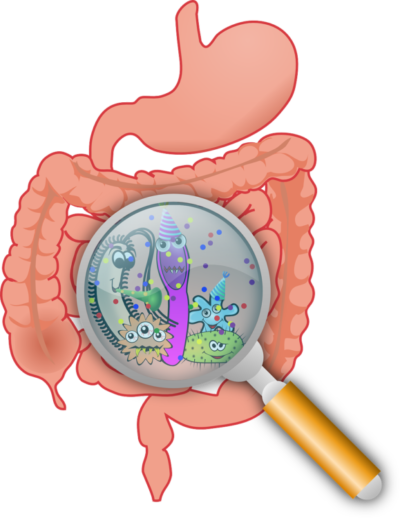Essential Oils And Our Microbiome (AKA…Our Gut Bugs). There have been many blogs stating that essential oils are great for our gut health, and that they provide us with a healthy microbiome. The issue with statements like these is that people walk away from reading these articles thinking that essential oils work much like a prebiotic or probiotic….when that has yet to be proven. With an education in Aromatic Medicine, I can see how these statements or claims are somewhat like a telephone game. My goal is to help you see what I mean by that. Let’s take a look at our gut health…one of my favorite topics, and how essential oils can play a role. It’s not what you think!
There are many things that can disrupt the function of our gut, which is also called our second brain. There is a strong relationship between the food that we eat as well as our levels of stress in regards to how our gut functions, and our overall health. Chronic stress is not our gut’s friend. Other things that effects our gut health are alcohol, antibiotics, modern day wheat, NSAID’s, and the jury is still out on GMO’s (although I believe they are detrimental on more levels of our health than we can even imagine).
When we look at how many things in modern day society is wreaking havoc on our gut microbiome, looking at statistics of how many people are dealing with afflictions such as leaky gut, dysbiosis, SIBO, Crohn’s disease, C diff, and others…it is quite dizzying how “dis” eased our digestive systems really are. Experts publish articles and books every day on this very topic, discussing what we can do to restore healthy levels of bacteria.
You see, our gut bacteria is a complex system, with good and bad forever seeking balance. Just as all of our bodies have cancer cells, and our immune systems are always working to combat these cells and “eat/destroy cancer cells” or what is termed phagocytosis, our guts always have “bad” bacteria. The goal is to keep balance. Here is previous article of mine speaking to how food and emotions play a role in our digestive health.
On to Essential Oils
You will be hard-pressed to find papers or research studies that show beyond a shadow of a doubt that essential oils provide your gut with healthy bacteria, that is not their role. Essential oils can be used to bring balance in another way. If you are suffering from too much unhealthy bacteria (overgrowth), essential oils can help! Challenges aside, as we know that essential oils being used as medicine, specifically Aromatic Medicine, is yet to be accepted here in the United States as legal by any aromatherapist OR Chiropractor, etc.. Back to the facts.
If you were suffering from SIBO (small intestinal bacterial overgrowth) or C diff (clostridium difficile colitis) for example, essential oils taken via a suppository and/or capsule can assist in killing off the bad bacteria.
This first study, looking at overall dysbiosis (a term used for overall microbial imbalance), it was found that specific essential oils can help to bring about balance by killing bad bacteria: Caraway Carum carvi, Lavender Lavandula angustifolia and Bitter Orange Citrus aurantium var. amara were the essential oils highlighted in this study. This study was performed in-vitro, which means in a test tube or petri dish, or elsewhere outside of a living organism. The essential oils tested showed to have significant antimicrobial activity. Now, those that are trained in the more advanced topics of aromatherapy know that what happens outside of the body via a test tube or petri dish does not always equate to what happens inside of the body, but this study is promising.
Other essential oils that have been shown to have antimicrobial activity are Basil Ocimum basilicum and Oregano Origanum vulgare (not an all-inclusive list).
This next study shows how the antimicrobial effects of Oregano Origanum vulgare were successful at restoring balance from Salmonella Enteritidis in minced sheep meat, again an in-vitro study. You can read the full report here.
*TIP- Do not confuse Oil of Oregano with Oregano Essential Oil. They are not the same thing, nor do they provide the same benefits in every instance.
What these studies and many more show are that essential oils can work to reduce bad gut bacteria or overgrowth to restore balance, to coax the gut back to health.
Essential oils have not been proven beyond a shadow of a doubt to wipe out good bacteria as well like we know that antibiotics do, but perhaps more importantly…essential oils do not provide our gut with good bacteria. What are a few things that do?
Bring on the Good Bugs
There are plenty of things that we can do to maintain or restore a healthy balance in our microbiome. (If you have been diagnosed with SIBO, or C diff, etc., be sure to seek out medical care). Let’s very briefly look at the top three:
1.Fermented Foods
Sauerkraut, kefir, miso, and yogurt provide us with various types of probiotic bacteria. When looking at volume consumed, you need very little of any one of these per day to obtain very large levels of beneficial bacteria.
2. Prebiotics
Any food that supplies you with healthy soluble or insoluble fiber is something to think about. Think freshly ground flaxseed, chia seed, or beans and legumes for example. You may be thinking that you are always hearing about probiotics, why prebiotics? A good way to look at it is probiotics replenish, and prebiotics nourish. They are both very much needed for gut health.
3.Probiotics
You can purchase capsules of probiotics to take every day. The number of strains per capsule is not as important as which ones you are taking for your specific situation. A great resource that covers everything gut related, including plenty of gut healthy recipes was written by a friend and colleague Lindsay Boyer entitled: The Everything Guide to Gut Health. This is one book you should definitely invest in if your gut health needs attention.
What You Should Avoid
I see both on the Internet and in social media people stating that they take Oregano essential oil in capsules every day for gut health. I hope that now you can see how that is detrimental to your gut health. IF you know you have a problem and are under the care of a trained professional, that is one thing (Someone trained in Aromatic Medicine would not suggest ongoing treatment, there is a time frame for treatment, 7-10 days for example. All dependent on the severity of the issue). Abuse of essential oils can and do cause more problems than they help.
It is equally important to not take the advice of someone who is not heavily trained. Opinions on how to use essential oils are rampant on the Internet, we must always utilize caution in what we read or are told. I am a stickler for this, even when I am given a prescription from a doctor, I ask a million questions and research the pill and it’s side effects before I take it. It is crucial you do so as well. The statement that all essential oils are natural and are therefore safe, does not hold water here.
Closing
As we can see, there are some things we do know about essential oils and our gut, but others are not yet clear. Please do look through some of the references and resources for further reading on the topic, when we know better we do better.
Papers Referenced Within the Article
Hawrelak, J. et al. (2009) Essential Oils in the Treatment of Intestinal Dysbiosis: A Preliminary in vitro Study. Alternative Medicine Review Vol. 14 No. 4 http://www.altmedrev.com/publications/14/4/380.pdf
Govaris, A. et al (2010) The antimicrobial effect of oregano essential oil, nisin and their combination against Salmonella Enteritidis in minced sheep meat during refrigerated storage. International Journal of Food Microbiology. Vo. 137. Issues 2-3 http://www.sciencedirect.com/science/article/pii/S0168160509006709
Additional Studies for Review
Gong, W. et al. (2005)Antimicrobial activity of essential oils and structurally related synthetic food additives towards selected pathogenic and beneficial gut bacteria. Journal of Applied Microbiology. p 296-305
Logan, A. Beaulne, T., (2002) The Treatment of Small Intestinal Bacterial Overgrowth With Enteric-Coated Peppermint Oil :A Case Report. Alternative Medicine Review. Vol.7 Number 5. http://www.altmedrev.com/publications/7/5/410.pdf
Santos, F. Miranda-Novales, M. (2012) Essential oils from aromatic herbs as antimicrobial agents. Current Opinion in Biotechnology 23:136-141.DOI 10.1016/j.copbio.2011.08.005
Further Reading
Junger, A. Clean Gut
Tetro, J. Allen Ver-coe, E. The Human Microbiome Handbook
Resources
Digestive Center for Wellness. Retrieved from https://www.digestivecenterforwellness.com/
Gut Microbiota for Health. Retrieved from http://www.gutmicrobiotaforhealth.com/en/home/
Your Digestive System: 5 Ways to Support Gut Health, via John Hopkins Medicine. Retrieved from
http://www.hopkinsmedicine.org/health/healthy_aging/healthy_body/your-digestive-system-5-ways-to-support-gut-health

Like so many practices in life, I encourage you to become educated on the proper use of essential oils. When using them, please do so cautiously, understanding that there is often misinformation on the internet. You can be assured that I support only educated and proven resources. While essential oils should not be feared they should be respected and used properly to ensure the safety of the individuals using them.
Please note that I am not a medical practitioner. The content of this website is provided for general informational purposes only and is not intended as, nor should it be considered a substitute for, professional medical advice. Do not use the information on this website for diagnosing or treating any medical or health condition. If you have or suspect you have a medical problem, promptly contact your professional healthcare provider. By using this website, you assume full responsibility and liability for your own actions.
[mailpoet_form id=”2″]




